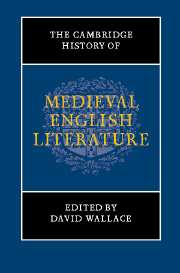Book contents
- Frontmatter
- I AFTER THE NORMAN CONQUEST
- II WRITING IN THE BRITISH ISLES
- III INSTITUTIONAL PRODUCTION
- IV AFTER THE BLACK DEATH
- Introduction
- 18 Alliterative poetry
- 19 Piers Plowman
- 20 The Middle English Mystics
- 21 Geoffrey Chaucer
- 22 John Gower
- 23 Middle English lives
- V BEFORE THE REFORMATION
- Chronological outline of historical events and texts in Britain, 1050–1550
- Bibliography
- Index of manuscripts
- Index
- References
20 - The Middle English Mystics
from IV - AFTER THE BLACK DEATH
Published online by Cambridge University Press: 28 March 2008
- Frontmatter
- I AFTER THE NORMAN CONQUEST
- II WRITING IN THE BRITISH ISLES
- III INSTITUTIONAL PRODUCTION
- IV AFTER THE BLACK DEATH
- Introduction
- 18 Alliterative poetry
- 19 Piers Plowman
- 20 The Middle English Mystics
- 21 Geoffrey Chaucer
- 22 John Gower
- 23 Middle English lives
- V BEFORE THE REFORMATION
- Chronological outline of historical events and texts in Britain, 1050–1550
- Bibliography
- Index of manuscripts
- Index
- References
Summary
The terms ‘Middle English mystics’ and ‘fourteenth-century English mystics’ have been devised in this century as ways of constituting a heterogeneous club of four, or five, writers whose works span the years between c. 1330 and c. 1440. The writers are the hermit, Richard Rolle (d. 1349), author of a large body of ecstatic commentaries and treatises on the perfect life in Latin (primarily) and English; the lawyer and Augustinian canon, Walter Hilton (d. 1396), author of a dozen or so theological and controversial works in English and Latin; the anchoress, Julian of Norwich (d. after 1415), author of two versions of A Revelation of Love, a deeply ambitious work of speculative theology developed from a set of visions experienced in 1373; the author of The Cloud of Unknowing and several other English works; and Margery Kempe (d. after 1438), author of The Book of Margery Kempe, a work whose membership of the canon has been a matter of continuing controversy. Other writers have been proposed for inclusion; but the canon – institutionalized in journals, bibliographies, conferences, and scholarly and devotional books – has undergone no modifications since the eruption of Kempe on to the scene half a century ago.
In form, this discussion follows the scholarly tradition it is partly intended to introduce, devoting much of its analysis to these five writers and the period in which they lived. The overarching theme of this chapter, however, is that both the canon of ‘Middle English mystics’ and the term ‘mysticism’ itself have largely outlived their usefulness to scholars.
- Type
- Chapter
- Information
- The Cambridge History of Medieval English Literature , pp. 539 - 565Publisher: Cambridge University PressPrint publication year: 1999
References
- 16
- Cited by

